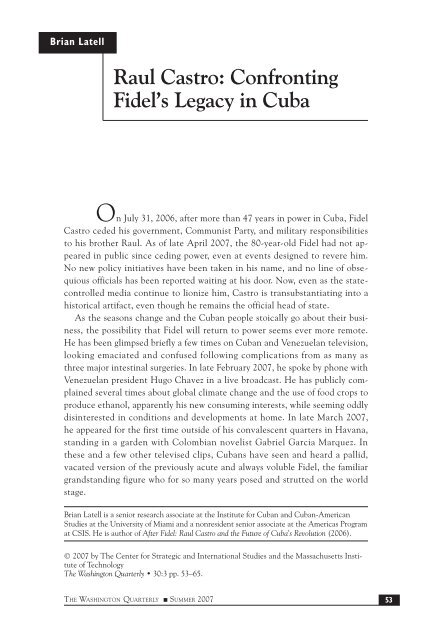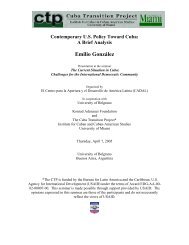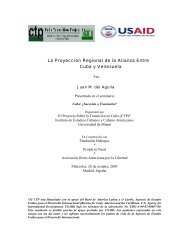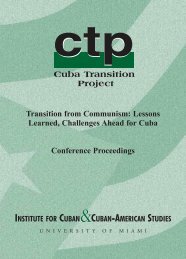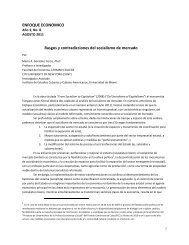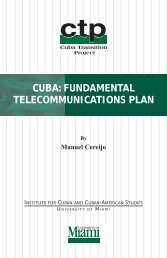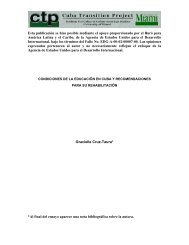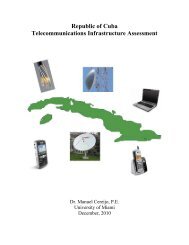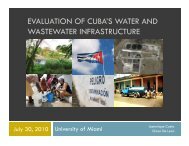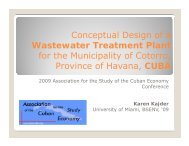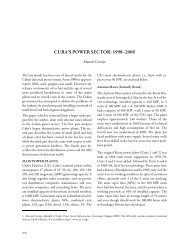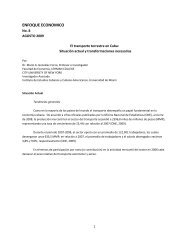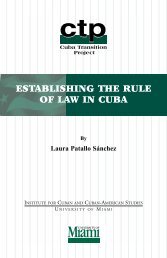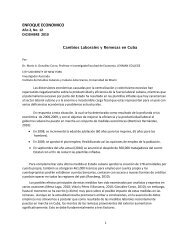Raul Castro: Confronting Fidel's Legacy in Cuba - Cuba Transition ...
Raul Castro: Confronting Fidel's Legacy in Cuba - Cuba Transition ...
Raul Castro: Confronting Fidel's Legacy in Cuba - Cuba Transition ...
You also want an ePaper? Increase the reach of your titles
YUMPU automatically turns print PDFs into web optimized ePapers that Google loves.
Brian Latell<br />
<strong>Raul</strong> <strong>Castro</strong>: <strong>Confront<strong>in</strong>g</strong><br />
Fidel’s <strong>Legacy</strong> <strong>in</strong> <strong>Cuba</strong><br />
On July 31, 2006, after more than 47 years <strong>in</strong> power <strong>in</strong> <strong>Cuba</strong>, Fidel<br />
<strong>Castro</strong> ceded his government, Communist Party, and military responsibilities<br />
to his brother <strong>Raul</strong>. As of late April 2007, the 80-year-old Fidel had not appeared<br />
<strong>in</strong> public s<strong>in</strong>ce ced<strong>in</strong>g power, even at events designed to revere him.<br />
No new policy <strong>in</strong>itiatives have been taken <strong>in</strong> his name, and no l<strong>in</strong>e of obsequious<br />
officials has been reported wait<strong>in</strong>g at his door. Now, even as the statecontrolled<br />
media cont<strong>in</strong>ue to lionize him, <strong>Castro</strong> is transubstantiat<strong>in</strong>g <strong>in</strong>to a<br />
historical artifact, even though he rema<strong>in</strong>s the official head of state.<br />
As the seasons change and the <strong>Cuba</strong>n people stoically go about their bus<strong>in</strong>ess,<br />
the possibility that Fidel will return to power seems ever more remote.<br />
He has been glimpsed briefly a few times on <strong>Cuba</strong>n and Venezuelan television,<br />
look<strong>in</strong>g emaciated and confused follow<strong>in</strong>g complications from as many as<br />
three major <strong>in</strong>test<strong>in</strong>al surgeries. In late February 2007, he spoke by phone with<br />
Venezuelan president Hugo Chavez <strong>in</strong> a live broadcast. He has publicly compla<strong>in</strong>ed<br />
several times about global climate change and the use of food crops to<br />
produce ethanol, apparently his new consum<strong>in</strong>g <strong>in</strong>terests, while seem<strong>in</strong>g oddly<br />
dis<strong>in</strong>terested <strong>in</strong> conditions and developments at home. In late March 2007,<br />
he appeared for the first time outside of his convalescent quarters <strong>in</strong> Havana,<br />
stand<strong>in</strong>g <strong>in</strong> a garden with Colombian novelist Gabriel Garcia Marquez. In<br />
these and a few other televised clips, <strong>Cuba</strong>ns have seen and heard a pallid,<br />
vacated version of the previously acute and always voluble Fidel, the familiar<br />
grandstand<strong>in</strong>g figure who for so many years posed and strutted on the world<br />
stage.<br />
Brian Latell is a senior research associate at the Institute for <strong>Cuba</strong>n and <strong>Cuba</strong>n-American<br />
Studies at the University of Miami and a nonresident senior associate at the Americas Program<br />
at CSIS. He is author of After Fidel: <strong>Raul</strong> <strong>Castro</strong> and the Future of <strong>Cuba</strong>’s Revolution (2006).<br />
© 2007 by The Center for Strategic and International Studies and the Massachusetts Institute<br />
of Technology<br />
The Wash<strong>in</strong>gton Quarterly • 30:3 pp. 53–65.<br />
THE WASHINGTON QUARTERLY ■ SUMMER 2007 53
l Brian Latell THE WASHINGTON QUARTERLY ■ SUMMER 2007<br />
Some foreign observers <strong>in</strong> Havana have concluded that these appearances<br />
have been choreographed at least <strong>in</strong> part by his successors to dampen whatever<br />
expectations may be left that Fidel will be able to fully function aga<strong>in</strong> <strong>in</strong><br />
office. Noth<strong>in</strong>g of what was seen of his dim<strong>in</strong>ished physical condition seemed<br />
calculated to reassure those who hope for his return. Although he could yet<br />
reappear <strong>in</strong> the halls of power <strong>in</strong> Havana, the evidence of his physical debilitation<br />
and cognitive <strong>in</strong>consistencies suggests<br />
that if he does return, it will be <strong>in</strong> an emeritus<br />
The new regime has<br />
signaled that there<br />
will be no political<br />
relaxation.<br />
capacity. In fact, the new leadership and probably<br />
the bulk of the <strong>Cuba</strong>n people seem to<br />
have moved on, relieved to no longer endure<br />
his endless monologues while suppress<strong>in</strong>g all<br />
hope of relief from his strangl<strong>in</strong>g ideological<br />
<strong>in</strong>transigence.<br />
There is even reason to suspect that <strong>Raul</strong><br />
and others around him do not want Fidel back.<br />
For example, surely it was not happenstance that <strong>Raul</strong> commented, perhaps <strong>in</strong><br />
jest and perhaps not, <strong>in</strong> an impromptu discussion he <strong>in</strong>itiated with foreign reporters<br />
<strong>in</strong> Havana <strong>in</strong> February 2007 that although his brother speaks by phone<br />
with other government officials, “it is my good fortune that he never calls me.” 1<br />
The fad<strong>in</strong>g Fidel still has many ardent followers on the island. Yet, most<br />
<strong>Cuba</strong>ns have high expectations that his abdication will soon make important<br />
changes possible. They have been feel<strong>in</strong>g the first blush of hope that a more<br />
tolerant, economically liberalized, outwardly oriented era may be dawn<strong>in</strong>g.<br />
In a departure from Fidel’s standard rhetoric, for example, the new regime is<br />
admitt<strong>in</strong>g that the country’s economic problems are systemic, the results of<br />
corruption, <strong>in</strong>efficiency, and overly rigid central plann<strong>in</strong>g. Internal scapegoats<br />
and the U.S. economic embargo are no longer <strong>in</strong>cessantly be<strong>in</strong>g blamed. Previously<br />
persecuted groups, <strong>in</strong>clud<strong>in</strong>g <strong>in</strong>tellectuals, artists, and homosexuals, as<br />
well as deeply disaffected youth are beg<strong>in</strong>n<strong>in</strong>g to see <strong>in</strong> <strong>Raul</strong> the mak<strong>in</strong>gs of a<br />
Communist reformer. It is not yet clear, however, whether or not those hopes<br />
will be viciously dashed.<br />
In early April 2007, his regime began implement<strong>in</strong>g a tough new labor code<br />
<strong>in</strong>tended to wr<strong>in</strong>g corruption, <strong>in</strong>efficiency, and malfeasance out of the workplace.<br />
Other measures to extirpate illegal satellite television antennas and to<br />
restrict Internet use to the approximately 2 percent of the populace now with<br />
access have also demonstrated the new regime’s determ<strong>in</strong>ation to ma<strong>in</strong>ta<strong>in</strong> absolute<br />
political control. <strong>Raul</strong> has often <strong>in</strong> the past taken the lead <strong>in</strong> implement<strong>in</strong>g<br />
such unpopular, draconian measures. As a result, he is mostly hated and feared<br />
by the <strong>Cuba</strong>n people, remembered as his brother’s most brutal executioner and<br />
hard-l<strong>in</strong>e enforcer. Unlike Fidel, he is dour and uncharismatic and will therefore<br />
54
<strong>Raul</strong> <strong>Castro</strong>: <strong>Confront<strong>in</strong>g</strong> Fidel’s <strong>Legacy</strong> <strong>in</strong> <strong>Cuba</strong> l<br />
have difficulty soften<strong>in</strong>g his image or mak<strong>in</strong>g restrictive new policies seem palatable<br />
to the populace. As long as his brother l<strong>in</strong>gers on the scene, <strong>Raul</strong>’s room for<br />
maneuver and <strong>in</strong>novation will be severely constra<strong>in</strong>ed.<br />
Manag<strong>in</strong>g the <strong>Transition</strong><br />
Nonetheless, the first months of <strong>Raul</strong>’s provisional government augured well<br />
for cont<strong>in</strong>uity and stability. He made no obvious mistakes, the leadership class<br />
showed no signs of fissures, and the streets were calm. The loosen<strong>in</strong>g of Fidel’s<br />
iron grip did not cause the system to collapse or even to quake, as so many foreign<br />
observers had always anticipated. Underestimated and misunderstood for<br />
decades, <strong>Raul</strong> has so far been effective and confident <strong>in</strong> his new role. Moreover,<br />
the revolution and the regime proved to be more deeply <strong>in</strong>stitutionalized<br />
than many had thought.<br />
He has not taken any chances either. The highest priority has been to<br />
ma<strong>in</strong>ta<strong>in</strong> order. Any serious <strong>in</strong>stability would delegitimize the successor regime<br />
<strong>in</strong> its <strong>in</strong>fancy and could spur cycles of violence, even ruptures with<strong>in</strong> the<br />
govern<strong>in</strong>g elite. <strong>Raul</strong> and his security establishment have no illusions that if<br />
order were to beg<strong>in</strong> break<strong>in</strong>g down, a massive and chaotic migration by sea<br />
to Florida <strong>in</strong>evitably would ensue, putt<strong>in</strong>g the leadership dangerously at odds<br />
with the United States.<br />
Accord<strong>in</strong>gly, reserve military forces of at least 10,000, accord<strong>in</strong>g to press<br />
reports, were called up <strong>in</strong> the first days after Fidel’s withdrawal, and police<br />
as well as undercover security personnel were dispersed to potential trouble<br />
spots. Havana neighborhoods that had experienced previous unrest and particularly<br />
at-risk locales across the island were blanketed. Human rights activists,<br />
political dissidents, and almost all of the known pacifist opposition were<br />
put under coercive surveillance or deta<strong>in</strong>ed. Prohibitions aga<strong>in</strong>st any form<br />
of political expression or participation <strong>in</strong>dependent of the Communist Party<br />
cont<strong>in</strong>ue to be enforced as ruthlessly as they always were by Fidel. Political<br />
prisoners rema<strong>in</strong> <strong>in</strong>carcerated <strong>in</strong> mostly deplorable conditions, except for a<br />
few released for extreme medical reasons. In these and many other ways, the<br />
new regime has signaled that there will be no political relaxation.<br />
Yet, although uphold<strong>in</strong>g Fidel’s implacable political control, <strong>Raul</strong> is known<br />
to admire Ch<strong>in</strong>a- and Vietnam-style economic reform. He has spoken favorably<br />
of the laws of supply and demand, sent trusted military officers abroad<br />
to study bus<strong>in</strong>ess and management, and hosted foreign <strong>in</strong>structors to teach<br />
civilian and military officials <strong>in</strong> Havana. He knows that he must improve the<br />
country’s economic performance, although the emphasis thus far has been on<br />
elim<strong>in</strong>at<strong>in</strong>g <strong>in</strong>efficiencies and corruption rather than on chipp<strong>in</strong>g away at the<br />
centrally planned system. The decentraliz<strong>in</strong>g reforms that he and many of his<br />
THE WASHINGTON QUARTERLY ■ SUMMER 2007<br />
55
l Brian Latell THE WASHINGTON QUARTERLY ■ SUMMER 2007<br />
advisers advocate, however, are not likely to be implemented until after Fidel<br />
has passed from the scene or is officially <strong>in</strong>capacitated.<br />
Who Is <strong>Raul</strong> <strong>Castro</strong>?<br />
<strong>Raul</strong> himself is the most important variable <strong>in</strong> <strong>Cuba</strong>’s immediate future because<br />
his leadership abilities and qualities are so poorly understood. He has<br />
always deferred to Fidel, function<strong>in</strong>g mostly <strong>in</strong> the background, and as a result<br />
attracted scant <strong>in</strong>terest <strong>in</strong> the past. Only one biographical study of him has<br />
ever been published <strong>in</strong> any language. 2 His complex, contradictory, and protean<br />
nature makes predictions about his behavior especially difficult. He has<br />
a well-earned reputation for bloodthirsty and brutal behavior dat<strong>in</strong>g back 50<br />
years, but family members, former friends, and<br />
close associates <strong>in</strong>sist that he also has a compassionate<br />
and selfless side. There is also reason<br />
to believe he has mellowed and become more<br />
pragmatic <strong>in</strong> recent years.<br />
S<strong>in</strong>ce the late 1950s, he has been a full<br />
partner with Fidel, his only truly <strong>in</strong>dispensable<br />
ally. In fact, Fidel probably could not<br />
have survived <strong>in</strong> power for so many years had<br />
it not been for <strong>Raul</strong>’s steady management of<br />
the armed forces. By far the world’s longest-serv<strong>in</strong>g defense m<strong>in</strong>ister and<br />
<strong>Cuba</strong>’s only four-star general, <strong>Raul</strong> has presided over an <strong>in</strong>stitution that<br />
dist<strong>in</strong>guished itself <strong>in</strong> the 1970s and 1980s on distant Third World battlefields,<br />
notably <strong>in</strong> Angola and Ethiopia. Unlike nearly every other country<br />
<strong>in</strong> Lat<strong>in</strong> America over the last half century, moreover, his armed forces<br />
have never been prone to coup plott<strong>in</strong>g, barracks revolts, or partisan unrest.<br />
The steady ma<strong>in</strong>tenance of military efficiency and discipl<strong>in</strong>e has been<br />
<strong>Raul</strong>’s most notable accomplishment.<br />
He has many exceptional leadership qualities: organizational and managerial<br />
skills, patience, the ability to delegate and <strong>in</strong>stitutionalize, and a certa<strong>in</strong><br />
methodical creativity. He depends psychologically on family, old friends, and<br />
trusted colleagues <strong>in</strong> ways that Fidel never did. <strong>Raul</strong> is l<strong>in</strong>ear and straightforward,<br />
whereas Fidel was known for his leaps of imag<strong>in</strong>ation. He is cautious<br />
and practical, consult<strong>in</strong>g and collaborat<strong>in</strong>g with others, whereas Fidel was<br />
characteristically audacious and opportunistic. <strong>Raul</strong> agonizes and temporizes<br />
when unpleasant decisions must be made, while Fidel almost always acted with<br />
alacrity and unwaver<strong>in</strong>g self-confidence. Yet, after so many years of Fidel’s<br />
flamboyant and hegemonic leadership style, <strong>Raul</strong>’s more stolid and systematic<br />
approach may fail to <strong>in</strong>spire confidence.<br />
<strong>Raul</strong>’s legitimacy and<br />
appeal is probably<br />
most at issue among<br />
<strong>Cuba</strong>’s youth.<br />
56
<strong>Raul</strong> <strong>Castro</strong>: <strong>Confront<strong>in</strong>g</strong> Fidel’s <strong>Legacy</strong> <strong>in</strong> <strong>Cuba</strong> l<br />
Some other key variables rooted <strong>in</strong> his personality and experiences also<br />
raise <strong>in</strong>terest<strong>in</strong>g questions. Will he now <strong>in</strong>st<strong>in</strong>ctively try to run <strong>Cuba</strong> as he<br />
has overseen the armed forces, by apply<strong>in</strong>g unyield<strong>in</strong>g praetorian discipl<strong>in</strong>e<br />
throughout the civilian sector? Will the merciless or compassionate side of<br />
his nature be more likely to prevail if he is faced with the need to deal with<br />
mount<strong>in</strong>g civilian dissatisfaction? Perhaps most importantly, he has never by<br />
himself managed a serious crisis, domestic or foreign. How would <strong>Raul</strong> deal<br />
with a major crisis? Might he and other leaders grossly miscalculate, say, by<br />
wait<strong>in</strong>g too long to dampen rapidly ris<strong>in</strong>g popular expectations or to stifle protests<br />
<strong>in</strong> the streets? Conversely, he might <strong>in</strong>st<strong>in</strong>ctively revert to his traditional<br />
brutality and violently suppress dissent but <strong>in</strong> the process spawn even more<br />
powerful opposition.<br />
<strong>Raul</strong>’s Legitimacy<br />
A hardened revolutionary s<strong>in</strong>ce the early 1950s, the younger <strong>Castro</strong> has been<br />
lead<strong>in</strong>g <strong>Cuba</strong> <strong>in</strong> a manner <strong>in</strong>tended to contrast with Fidel’s manic, narcissistic<br />
style. Even before he assumed the mantle of power, <strong>Raul</strong> made it clear he would<br />
govern <strong>in</strong> a self-effac<strong>in</strong>g, consultative, and collegial fashion, consistent with<br />
how he has managed the military establishment s<strong>in</strong>ce 1959. 3 The country’s<br />
preem<strong>in</strong>ent organizer and manager—the “producer” of <strong>Cuba</strong>’s revolution <strong>in</strong><br />
partnership with Fidel, its visionary “director”—<strong>Raul</strong> is content operat<strong>in</strong>g <strong>in</strong> the<br />
background, delegat<strong>in</strong>g responsibilities and shar<strong>in</strong>g both power and the limelight<br />
with the military and civilian leaders who reciprocate his confidence.<br />
The legitimacy of <strong>Raul</strong>’s claim to succession was never <strong>in</strong> doubt, at least<br />
with<strong>in</strong> rul<strong>in</strong>g circles. Fidel signed a proclamation mak<strong>in</strong>g the transfer official,<br />
but that document merely reiterated his frequently stated <strong>in</strong>structions that his<br />
brother should succeed him. For the last three decades, <strong>Cuba</strong>’s Communist<br />
constitution has also made this clear. Moreover, the highest-level Communist<br />
Party and government conclaves have repeatedly ratified the dynastic succession.<br />
Even <strong>Cuba</strong>ns who despise <strong>Raul</strong> tend to grudg<strong>in</strong>gly acknowledge that, assum<strong>in</strong>g<br />
his health permits, his permanent ascension is all but <strong>in</strong>evitable.<br />
Most importantly, <strong>Raul</strong>’s claim to succession is secured by the raw power<br />
that he holds. Civilians <strong>in</strong> the govern<strong>in</strong>g elite know that as long as he reta<strong>in</strong>s<br />
the support of <strong>Cuba</strong>’s two most powerful <strong>in</strong>stitutions, the armed forces and<br />
the M<strong>in</strong>istry of Interior’s <strong>in</strong>telligence, police, and security agencies, he will be<br />
shielded from any comb<strong>in</strong>ation of civilian <strong>in</strong>trigue. He also controls the apparatus<br />
of the Communist Party, the country’s third most powerful <strong>in</strong>stitution.<br />
In May 2006, he saw to the re<strong>in</strong>statement of its secretariat and staffed it with<br />
trusted subord<strong>in</strong>ates. 4 The ultimate organizer, <strong>Raul</strong> knows that he needs that<br />
body so that he can better manage and revitalize the party.<br />
THE WASHINGTON QUARTERLY ■ SUMMER 2007<br />
57
l Brian Latell THE WASHINGTON QUARTERLY ■ SUMMER 2007<br />
Wisely, <strong>Raul</strong> has been construct<strong>in</strong>g a broadly based regime, draw<strong>in</strong>g on officials<br />
with contrast<strong>in</strong>g revolutionary pedigrees and from different backgrounds<br />
and generations. Even perennial rivals <strong>in</strong> the leadership, notably the hard-l<strong>in</strong>e<br />
communications and <strong>in</strong>formation m<strong>in</strong>ister Ramiro Valdes, seem to have committed<br />
to collaborate with him. Encouraged to play more conspicuous leadership<br />
roles than what Fidel ever permitted, the most <strong>in</strong>fluential <strong>in</strong> this second<br />
tier of officials are discreetly position<strong>in</strong>g for the next succession after both<br />
<strong>Castro</strong> brothers are gone. They are confident their chances will come with<strong>in</strong><br />
the next five or six years or quite possibly sooner.<br />
Civilian officials have no wherewithal or <strong>in</strong>centive to challenge <strong>Raul</strong>. It<br />
is better for them to rally around him, seek<strong>in</strong>g the best deals possible rather<br />
than provok<strong>in</strong>g confrontations that could spark <strong>in</strong>stability. Most believe, <strong>in</strong><br />
any event, that their prospects for advancement are now more promis<strong>in</strong>g than<br />
they were under Fidel’s self-centered leadership and that <strong>Raul</strong> is s<strong>in</strong>cere <strong>in</strong><br />
want<strong>in</strong>g to govern <strong>in</strong> a more collegial and ordered regime that enlists their<br />
<strong>in</strong>volvement. They undoubtedly also calculate that <strong>Raul</strong> will be an <strong>in</strong>terim<br />
leader. Turn<strong>in</strong>g 76 years old on June 3, 2007, and a long-time heavy dr<strong>in</strong>ker,<br />
he probably suffers from undisclosed health problems.<br />
The legitimacy that he enjoys with<strong>in</strong> the nomenclatura has no parallel among<br />
the populace at large, however, and especially not among <strong>Cuba</strong>’s restless younger<br />
generations. Thus, although his hold on power so far has been solid, a variety of<br />
developments could coalesce at any time to destabilize his regime. <strong>Raul</strong> knows,<br />
for example, that he must provide the populace with more opportunities and<br />
material advantages—bread rather than Fidel’s revolutionary circuses. Dur<strong>in</strong>g<br />
his <strong>in</strong>terregnum, he has already raised their expectations for mean<strong>in</strong>gful change,<br />
but he has been loath to beg<strong>in</strong> liberaliz<strong>in</strong>g the economy <strong>in</strong> any way that would<br />
seem to demean or repudiate his brother. This dilemma between the imperatives<br />
of beg<strong>in</strong>n<strong>in</strong>g a reform process and rema<strong>in</strong><strong>in</strong>g loyal to Fidel will only grow more<br />
acute until his brother dies or <strong>Raul</strong> demonstrates the will to abandon some of<br />
Fidel’s most cherished but counterproductive policies.<br />
W<strong>in</strong>n<strong>in</strong>g Over the Lost Generation<br />
<strong>Raul</strong>’s legitimacy and appeal is probably most at issue among <strong>Cuba</strong>’s youth. 5<br />
He ranked last among a dozen <strong>Cuba</strong>n officials <strong>in</strong> a 1999 poll of recent arrivals<br />
<strong>in</strong> Florida when they were asked which <strong>Cuba</strong>n leader they respected the most.<br />
Large numbers are apathetic and alienated from the system that provides them<br />
few possibilities for mean<strong>in</strong>gful work or a better life. Approximately one-fifth of<br />
the population, <strong>Cuba</strong>’s “lost generation” of about 2.5 million born s<strong>in</strong>ce 1980,<br />
has grown up dur<strong>in</strong>g times of economic hardship and global isolation. Young<br />
<strong>Cuba</strong>ns dream about escap<strong>in</strong>g, either illegally on rafts or small boats or by w<strong>in</strong>-<br />
58
<strong>Raul</strong> <strong>Castro</strong>: <strong>Confront<strong>in</strong>g</strong> Fidel’s <strong>Legacy</strong> <strong>in</strong> <strong>Cuba</strong> l<br />
n<strong>in</strong>g the lottery run by the U.S. diplomatic mission <strong>in</strong> Havana that chooses the<br />
approximately 20,000 per year who can emigrate legally to the United States.<br />
Foreign M<strong>in</strong>ister Felipe Perez Roque spoke at some length about this potentially<br />
volatile generation <strong>in</strong> a remarkably candid speech <strong>in</strong> December 2005. He<br />
reiterated warn<strong>in</strong>gs issued one month earlier<br />
by Fidel that the survivability of the revolution<br />
itself was at risk, admitt<strong>in</strong>g that large<br />
numbers of youth have little or no “historical<br />
memory” and are apathetic, lazy, and frustrated<br />
materialists. 6 In a society that cont<strong>in</strong>ues<br />
to value collectivist virtues, they are <strong>in</strong>dividualists<br />
lack<strong>in</strong>g <strong>in</strong> revolutionary convictions.<br />
Little has come of the foreign m<strong>in</strong>ister’s tirade<br />
because the regime has no viable short-term<br />
options for motivat<strong>in</strong>g or <strong>in</strong>volv<strong>in</strong>g the youth.<br />
No variable will be<br />
more important to<br />
<strong>Cuba</strong>n stability than<br />
command and control<br />
<strong>in</strong> the army.<br />
Few have access to the Internet. Propagandized news and enterta<strong>in</strong>ment is<br />
provided exclusively by the controlled media. With high unemployment levels,<br />
most youths struggle to fulfill their basic needs and face bleak prospects. They<br />
realize that the time and energy spent <strong>in</strong> pursu<strong>in</strong>g higher education yields few<br />
advantages because jobs <strong>in</strong> their professions do not exist and salaries are appall<strong>in</strong>gly<br />
low. Those with access to hard currency fare better, but often their<br />
higher liv<strong>in</strong>g standards come as the result of the humiliat<strong>in</strong>g, demoraliz<strong>in</strong>g<br />
compromises they make <strong>in</strong> deal<strong>in</strong>gs with foreign tourists.<br />
Their expectations for mean<strong>in</strong>gful change have been bolstered by <strong>Raul</strong>’s<br />
recognition that many of their compla<strong>in</strong>ts are valid and by <strong>in</strong>itiatives he has<br />
taken to assuage them. Late <strong>in</strong> 2006, he engaged a large audience of university<br />
students <strong>in</strong> Havana, implor<strong>in</strong>g them to “fearlessly” engage <strong>in</strong> debate about<br />
<strong>Cuba</strong>’s problems. Juventud Rebelde, the daily newspaper devoted to youth<br />
issues, has been transformed <strong>in</strong>to the most appeal<strong>in</strong>g and surpris<strong>in</strong>gly honest<br />
publication <strong>in</strong> <strong>Cuba</strong>. In December 2006, it published a poll survey<strong>in</strong>g 280<br />
youths about their hopes for the country’s future. 7 Many of their responses<br />
were disarm<strong>in</strong>gly candid. Some commented that <strong>Cuba</strong> will need “efficient<br />
leaders.” The editors noted that every one of those <strong>in</strong>terviewed hopes that<br />
economic conditions on the island will improve. Such brutal honesty <strong>in</strong> the<br />
controlled press was unheard of when Fidel was <strong>in</strong> charge.<br />
Will the Military Hold Together?<br />
S<strong>in</strong>ce its <strong>in</strong>ception <strong>in</strong> 1959, the military has been the one truly <strong>in</strong>dispensable<br />
guarantor of the regime and the most powerful, <strong>in</strong>fluential, and competent<br />
official <strong>in</strong>stitution. It has also been the richest one s<strong>in</strong>ce the 1990s because of<br />
THE WASHINGTON QUARTERLY ■ SUMMER 2007<br />
59
l Brian Latell THE WASHINGTON QUARTERLY ■ SUMMER 2007<br />
the large number of for-profit enterprises that active duty and retired senior<br />
officers have been allowed to operate, ma<strong>in</strong>ly <strong>in</strong> the tourist sector. 8<br />
<strong>Raul</strong> seems to enjoy the support of his generals. The most senior three-star<br />
corps general and <strong>in</strong>terior m<strong>in</strong>ister, Abelardo Colome Ibarra, is probably closer<br />
to him personally than any other officer. 9 Three other corps generals especially<br />
close to <strong>Raul</strong> will probably also play important roles <strong>in</strong> decisionmak<strong>in</strong>g for a<br />
number of years.<br />
Ulises Rosales del Toro, a former chief of<br />
The need to beg<strong>in</strong><br />
solidify<strong>in</strong>g the second<br />
round of succession<br />
is probably on <strong>Raul</strong>’s<br />
m<strong>in</strong>d often.<br />
staff, most recently has served as sugar m<strong>in</strong>ister.<br />
One of <strong>Raul</strong>’s most trusted and capable <strong>in</strong>timates,<br />
he is said to have been sent to a European<br />
country to study capitalist bus<strong>in</strong>ess and<br />
management techniques. He is considered a<br />
moderniz<strong>in</strong>g economic reformer and pragmatist.<br />
He is the lead<strong>in</strong>g candidate to become defense<br />
m<strong>in</strong>ister after <strong>Raul</strong>. The prospects for military<br />
unity and proficiency would be good under Rosales’s<br />
leadership, at least at the outset, although a number of potentially ru<strong>in</strong>ous<br />
fault l<strong>in</strong>es may already <strong>in</strong>tersect just below the surface of the <strong>in</strong>stitution. 10<br />
Tensions will <strong>in</strong>evitably multiply as officers and military <strong>in</strong>terest groups divide<br />
over policy choices, compete for resources and promotions, and argue about<br />
military missions <strong>in</strong> post-<strong>Castro</strong> <strong>Cuba</strong>. Once Fidel is gone, reform-m<strong>in</strong>ded officers<br />
are likely to advocate a break from his defense priorities, which have<br />
changed little s<strong>in</strong>ce the advent of the revolution. High levels of defense spend<strong>in</strong>g<br />
and preparedness have been justified by constantly stimulat<strong>in</strong>g exaggerated<br />
fears of a U.S. <strong>in</strong>vasion. Many modern officers understand, however, that there<br />
is really no such threat. The 50,000 to 60,000 regular personnel on active duty,<br />
augmented by vast numbers of reserves, militia, uniformed <strong>in</strong>telligence units,<br />
and special forces, constitute a capability that is out of proportion with <strong>Cuba</strong>’s<br />
defense needs. When relations with the United States eventually improve, the<br />
justification for such bloated military expenditures would be obviated.<br />
The restructur<strong>in</strong>g of the top ranks of the officer corps, mandatory retirements,<br />
and reassignments of key commanders that will occur dur<strong>in</strong>g the next<br />
several years could destabilize the <strong>in</strong>stitution, especially if handled poorly. In<br />
the short term, however, factionalism, officer unrest, and organized dissidence<br />
are not known to exist with<strong>in</strong> the armed forces. High-level civilian and military<br />
defectors who have arrived <strong>in</strong> the United States <strong>in</strong> the last several years<br />
have reported no such problems. The high command has had 17 years to assuage<br />
the tensions that resulted from jolt<strong>in</strong>g purges <strong>in</strong> the army and <strong>in</strong>terior<br />
m<strong>in</strong>istry <strong>in</strong> the summer of 1989. Nonetheless, reliable <strong>in</strong>formation about attitudes<br />
<strong>in</strong> the officer corps is limited.<br />
60
<strong>Raul</strong> <strong>Castro</strong>: <strong>Confront<strong>in</strong>g</strong> Fidel’s <strong>Legacy</strong> <strong>in</strong> <strong>Cuba</strong> l<br />
Of all the variables that could cause <strong>in</strong>stability <strong>in</strong> <strong>Cuba</strong> <strong>in</strong> the foreseeable future,<br />
none will be more important than command and control <strong>in</strong> the army. Cont<strong>in</strong>uity<br />
and stability will depend on how united and discipl<strong>in</strong>ed the officer corps<br />
rema<strong>in</strong>s. If the top ranks were to divide and prey on each other, <strong>Cuba</strong> would<br />
likely descend <strong>in</strong>to spread<strong>in</strong>g and perhaps regime-threaten<strong>in</strong>g <strong>in</strong>stability. One of<br />
the most likely causes of such a breakdown of command and control would be<br />
if orders were issued from the high command to use lethal force on protest<strong>in</strong>g<br />
civilians. The <strong>Castro</strong>s’ armed forces have never been known to do that.<br />
The ma<strong>in</strong>-l<strong>in</strong>e military leadership is more likely to sympathize with the<br />
people than to repress them violently, but there are elite units, such as the<br />
commandos, special forces, and leadership guard units, <strong>in</strong>clud<strong>in</strong>g the High<br />
Command Reserve, that are probably still fanatically loyal to Fidel. Once<br />
he is gone, they may or may not readily transfer their loyalties to <strong>Raul</strong> and<br />
could even become a destabiliz<strong>in</strong>g factor over time <strong>in</strong> the leadership mix. That<br />
would be true especially if some now-unknown charismatic commander assumed<br />
a politically assertive role.<br />
Unlike the regular military units, the special forces would be likely to carry<br />
out orders to use lethal force on civilians. If such bloodshed were to occur,<br />
the military could easily rupture, with hard-l<strong>in</strong>e and regular forces fall<strong>in</strong>g<br />
<strong>in</strong>to conflict with each other—a prelude to civil war and another massive<br />
sea-borne migration to Florida, which would provoke demands <strong>in</strong> the United<br />
States for a military response. If <strong>Cuba</strong>’s well-armed, well-tra<strong>in</strong>ed, and wellequipped<br />
military were to violently implode, the result<strong>in</strong>g <strong>in</strong>ternec<strong>in</strong>e conflict<br />
could be bloody and protracted.<br />
The ‘Third Man’ Problem<br />
Over the years, there have been many pretenders and aspirants to be next<br />
<strong>in</strong> the l<strong>in</strong>e of succession after the <strong>Castro</strong> brothers. Until now, however, none<br />
ever really had a chance of grasp<strong>in</strong>g that illusory brass r<strong>in</strong>g for long. There<br />
was never a “third man” either constitutionally or unofficially <strong>in</strong> the hierarchy<br />
because the <strong>Castro</strong>s have not permitted anyone else to be <strong>in</strong> a position from<br />
which to challenge them. Although <strong>Raul</strong> now realizes that a timely process of<br />
identify<strong>in</strong>g and legitimiz<strong>in</strong>g his successor is imperative for stability and cont<strong>in</strong>uity,<br />
no such deliberations will likely be revealed until after Fidel has died or<br />
is officially <strong>in</strong>capacitated.<br />
<strong>Raul</strong> has never explicitly said so, but he will likely turn over the presidency<br />
to a prom<strong>in</strong>ent civilian. He will probably also retire as defense m<strong>in</strong>ister. Long<br />
attracted to the first stage of the decentralized Ch<strong>in</strong>ese political-economic<br />
model, he probably <strong>in</strong>tends to yield those offices to trusted younger men who<br />
would be expected to preserve and modernize the revolution. Thereafter, <strong>Raul</strong>,<br />
THE WASHINGTON QUARTERLY ■ SUMMER 2007<br />
61
l Brian Latell THE WASHINGTON QUARTERLY ■ SUMMER 2007<br />
like Ch<strong>in</strong>a’s Deng Xiaop<strong>in</strong>g, will endeavor to lead from the background, hold<strong>in</strong>g<br />
on to perhaps only two of Fidel’s titles: first secretary of the Communist<br />
Party and commander <strong>in</strong> chief. Those changes would be generally popular with<br />
the <strong>Cuba</strong>n people and might also enhance the new government’s <strong>in</strong>ternational<br />
legitimacy.<br />
Unless he stumbles politically, Politburo<br />
Venezuelan support is<br />
critical to the viability<br />
of <strong>Cuba</strong>’s economy…<br />
member and vice president Carlos Lage seems<br />
to stand the best chance of succeed<strong>in</strong>g <strong>Raul</strong>.<br />
An experienced economic planner, Lage has<br />
worked well with both <strong>Castro</strong>s for many years,<br />
always keep<strong>in</strong>g his ego and reformist proclivities<br />
<strong>in</strong> check. He is respected by foreign diplomats<br />
and bus<strong>in</strong>esspeople for his pragmatism<br />
and charm and has led <strong>Cuba</strong>n diplomatic delegations abroad. Given his relative<br />
youth (he is <strong>in</strong> his mid-fifties), <strong>in</strong>telligence, and political skills, he could<br />
grow <strong>in</strong>to an <strong>in</strong>dependently powerful chief executive if promoted.<br />
In contrast, Politburo member and vice president Esteban Lazo would be<br />
more likely to serve as a figurehead president <strong>in</strong> the less likely event that he<br />
were chosen. In September 2006, <strong>Raul</strong> selected him to speak for <strong>Cuba</strong> at the<br />
UN General Assembly <strong>in</strong> New York where, follow<strong>in</strong>g a precedent twice established<br />
by Fidel, he traveled uptown to deliver a speech to a sympathetic audience<br />
<strong>in</strong> Harlem. His performance there was not skillful, probably because he<br />
has had little experience represent<strong>in</strong>g <strong>Cuba</strong> abroad. His race, however, would<br />
be a strong political asset, consider<strong>in</strong>g <strong>Cuba</strong>’s profoundly changed demographics.<br />
Today, considerably more than one-half of the population is black or dark<br />
sk<strong>in</strong>ned, and Lazo is attract<strong>in</strong>g <strong>in</strong>creas<strong>in</strong>g attention as the country’s highestrank<strong>in</strong>g<br />
African-descended leader.<br />
Two others often mentioned as candidates for third-man status actually<br />
seem to have little chance. National assembly president Ricardo Alarcon is<br />
suave and articulate but has no top management or policymak<strong>in</strong>g experience.<br />
Like Perez Roque, Alarcon is believed to be out of favor with <strong>Raul</strong>.<br />
The need to beg<strong>in</strong> solidify<strong>in</strong>g the second round of succession is probably on<br />
<strong>Raul</strong>’s m<strong>in</strong>d often. The longer he delays implement<strong>in</strong>g it, however, the greater<br />
the likelihood that rivals for his benediction will beg<strong>in</strong> to conspire and feud<br />
among themselves. Most dangerously of all for the regime, if <strong>Raul</strong> were to die<br />
or become <strong>in</strong>capacitated before the l<strong>in</strong>e of succession after him has been legitimized,<br />
destabiliz<strong>in</strong>g <strong>in</strong>fight<strong>in</strong>g would likely break out <strong>in</strong> the leadership. There<br />
are no procedures or likely pacts with<strong>in</strong> the next tier of civilian and military<br />
leaders that could ease such a transition. Even with<strong>in</strong> the top ranks of the<br />
officer corps, only Rosales del Toro might have the authority and legitimacy<br />
among his peers to ma<strong>in</strong>ta<strong>in</strong> command and control <strong>in</strong> the ranks. Popular un-<br />
62
<strong>Raul</strong> <strong>Castro</strong>: <strong>Confront<strong>in</strong>g</strong> Fidel’s <strong>Legacy</strong> <strong>in</strong> <strong>Cuba</strong> l<br />
rest would be likely to follow any such leadership crisis. Together, the <strong>Castro</strong><br />
brothers have been the essential glue that has held the regime together s<strong>in</strong>ce<br />
its <strong>in</strong>ception.<br />
The Venezuela Factor<br />
In the foreseeable future, Chavez will rema<strong>in</strong> a critical external variable affect<strong>in</strong>g<br />
the outlook for <strong>Cuba</strong>’s successor regime. His government provides<br />
subsidies that were valued at more than $2 billion <strong>in</strong> 2006. 11 Approximately<br />
100,000 barrels per day of crude and ref<strong>in</strong>ed petroleum is provided virtually<br />
free of charge, along with diesel and aviation fuel, some <strong>in</strong>vestment, and agricultural<br />
commodities. Although Venezuelan support is less than the $5–6<br />
billion <strong>in</strong> annual subsidies provided by the Soviet bloc dur<strong>in</strong>g the 1970s and<br />
1980s, it is critical to the viability of <strong>Cuba</strong>’s<br />
economy. If the subsidies were to end, the<br />
...The bulk of<br />
evidence suggests that<br />
Chavez and <strong>Raul</strong> are<br />
more rivals than allies.<br />
<strong>Cuba</strong>n economy would with<strong>in</strong> weeks plunge<br />
<strong>in</strong>to deep recession, accompanied by shortages<br />
of consumer products, energy blackouts,<br />
and transportation breakdowns. When those<br />
k<strong>in</strong>ds of hardships occurred <strong>in</strong> 1993 and 1994,<br />
large regime-threaten<strong>in</strong>g protests occurred <strong>in</strong><br />
Havana and nearby towns.<br />
Little is known about <strong>Raul</strong>’s relationship<br />
with the Venezuelan president. Some observers believe the two have established<br />
a close bond, as <strong>Raul</strong> controls the <strong>Cuba</strong>n <strong>in</strong>telligence and security<br />
services that ma<strong>in</strong>ta<strong>in</strong> an enormous presence <strong>in</strong> Venezuela, organiz<strong>in</strong>g and<br />
tra<strong>in</strong><strong>in</strong>g their Venezuelan counterparts. These observers argue that <strong>Raul</strong> must<br />
have been <strong>in</strong>cluded <strong>in</strong> most of Fidel’s frequent meet<strong>in</strong>gs <strong>in</strong> <strong>Cuba</strong> with Chavez<br />
<strong>in</strong> the past and that they have a natural concomitance of <strong>in</strong>terests. Yet, except<br />
for Venezuelan and <strong>Cuba</strong>n media coverage of <strong>Raul</strong> and Chavez together at<br />
Fidel’s bedside, no other evidence of meet<strong>in</strong>gs between the two seems to exist.<br />
<strong>Raul</strong> has not been reported to have traveled to Venezuela s<strong>in</strong>ce Chavez won<br />
power, and Chavez, who fawns on Fidel, rarely ever mentions <strong>Raul</strong>.<br />
The bulk of evidence suggests that the two men have little <strong>in</strong> common and<br />
are more rivals than allies. Their personal and leadership styles are starkly different.<br />
As Chavez heads down the path of centraliz<strong>in</strong>g political and economic<br />
power <strong>in</strong> Venezuela, <strong>Raul</strong> is probably contemplat<strong>in</strong>g the opposite, how to open<br />
segments of <strong>Cuba</strong>’s economy to market forces. Chavez, like his idol and mentor<br />
Fidel, seeks a glorious role on the world stage, especially <strong>in</strong> Lat<strong>in</strong> America,<br />
where he has been devot<strong>in</strong>g enormous energies and resources to build<strong>in</strong>g an<br />
entente supposedly reflect<strong>in</strong>g the ideals of South American <strong>in</strong>dependence<br />
THE WASHINGTON QUARTERLY ■ SUMMER 2007<br />
63
l Brian Latell THE WASHINGTON QUARTERLY ■ SUMMER 2007<br />
leader Simon Bolivar. <strong>Raul</strong>, <strong>in</strong> contrast, is preoccupied with <strong>Cuba</strong>’s <strong>in</strong>ternal<br />
problems and as yet has shown no <strong>in</strong>cl<strong>in</strong>ation to become personally <strong>in</strong>volved<br />
<strong>in</strong> <strong>in</strong>ternational postur<strong>in</strong>g. Notably, he has eschewed his role as provisional<br />
president of the Non-Aligned Movement follow<strong>in</strong>g its triennial conference <strong>in</strong><br />
Havana <strong>in</strong> September 2006.<br />
Furthermore, it may be reasonable to speculate that <strong>Raul</strong>’s generals, all of<br />
whom are experienced professionals, ma<strong>in</strong>ly feel contempt for the mercurial<br />
and boorish Chavez, a former lieutenant colonel who mounted a coup <strong>in</strong> 1992<br />
aga<strong>in</strong>st the democratically elected government <strong>in</strong> Caracas and aga<strong>in</strong>st his own<br />
superior officers. Yet, Chavez’s leverage over the <strong>Cuba</strong>ns is considerable. He<br />
could stoke <strong>in</strong>stability on the island with the stroke of a pen or more likely just<br />
a nod of his head.<br />
Look<strong>in</strong>g Ahead<br />
Generational and other tensions and uncerta<strong>in</strong>ties <strong>in</strong> <strong>Cuba</strong>n society seem<br />
certa<strong>in</strong> to <strong>in</strong>crease no matter what course <strong>Raul</strong> pursues. Expectations for liberaliz<strong>in</strong>g<br />
change already are high and are likely to reach considerable <strong>in</strong>tensity<br />
follow<strong>in</strong>g Fidel’s death. His depleted presence and participation <strong>in</strong> decisionmak<strong>in</strong>g<br />
has created a disturb<strong>in</strong>g conundrum for his successors. They are most<br />
likely <strong>in</strong> broad agreement that they must soon beg<strong>in</strong> to dismantle his rigid,<br />
centrally planned economic system and encourage an <strong>in</strong>dependent private<br />
sector. Until now, they have been unwill<strong>in</strong>g to go that far, <strong>in</strong>stead t<strong>in</strong>ker<strong>in</strong>g<br />
on the marg<strong>in</strong>s. The longer that stasis persists, the greater the chances that<br />
<strong>Cuba</strong>’s new leaders will beg<strong>in</strong> to compete and conflict.<br />
Instability dur<strong>in</strong>g or follow<strong>in</strong>g an <strong>in</strong>terregnum dom<strong>in</strong>ated by <strong>Raul</strong> could<br />
take many forms, depend<strong>in</strong>g on how those conditions were first ignited. At the<br />
lowest end of the threat spectrum, isolated popular disturbances <strong>in</strong> one or a<br />
few urban areas, sparked either by economic or political triggers, might prove<br />
to be relatively easily and bloodlessly conta<strong>in</strong>ed by the police and security<br />
forces. <strong>Cuba</strong>n leaders would probably seek to ameliorate the underly<strong>in</strong>g tensions<br />
by enact<strong>in</strong>g targeted reforms, for example by loosen<strong>in</strong>g restrictions on<br />
religious observance, <strong>in</strong>struction, and possibly organization, as well as through<br />
other measures.<br />
Yet, leaders will be <strong>in</strong>tent on prevent<strong>in</strong>g all forms of civil disobedience and<br />
disturbances, fear<strong>in</strong>g that once underway they could easily spiral out of control.<br />
Under conditions of susta<strong>in</strong>ed popular unrest, the regime could be faced for the<br />
first time s<strong>in</strong>ce the mid-1960s with a violent opposition that might beg<strong>in</strong> to coalesce<br />
<strong>in</strong>to organized cells. Post-Fidel leaders would be uncerta<strong>in</strong> and probably<br />
divided about how to respond to such challenges. Without the implacable Fidel<br />
to order merciless crackdowns and military campaigns to eradicate all opposi-<br />
64
<strong>Raul</strong> <strong>Castro</strong>: <strong>Confront<strong>in</strong>g</strong> Fidel’s <strong>Legacy</strong> <strong>in</strong> <strong>Cuba</strong> l<br />
tion, his successors would probably experiment with different means of reduc<strong>in</strong>g<br />
or co-opt<strong>in</strong>g new opposition elements. Moderates <strong>in</strong> <strong>Raul</strong>’s circle would<br />
advocate negotiations and concessions to pacify a ris<strong>in</strong>g opposition. Hard-l<strong>in</strong>ers<br />
would demand to do what Fidel would, brutally ext<strong>in</strong>guish<strong>in</strong>g all organized<br />
opposition to the old order. Their different<br />
strategies and priorities would <strong>in</strong> all likelihood<br />
generate discord and possibly open conflict.<br />
The uniformed services will be the key. The<br />
generals command<strong>in</strong>g the armed forces and <strong>in</strong>terior<br />
m<strong>in</strong>istry could force change at the top<br />
almost at will, even to the extent of back<strong>in</strong>g<br />
a rival to <strong>Raul</strong> or his eventual successor. Although<br />
both possibilities now appear unlikely,<br />
the generals will rema<strong>in</strong> more powerful than<br />
any conceivable comb<strong>in</strong>ation of civilian leaders,<br />
that is, as long as command and control <strong>in</strong><br />
Tensions and<br />
uncerta<strong>in</strong>ties seem<br />
certa<strong>in</strong> to <strong>in</strong>crease no<br />
matter what course<br />
<strong>Raul</strong> pursues.<br />
their ranks rema<strong>in</strong>s steadfast. As yet, therefore, it cannot be said with any confidence<br />
how <strong>Cuba</strong>’s new leaders will manage the revolution that for nearly a half<br />
century had been the s<strong>in</strong>gular creation of one man.<br />
Notes<br />
1. “Raúl <strong>Castro</strong> dice que Fidel ‘va mejorando’ y ‘está al tanto de todo,’” Reuters, February<br />
8, 2007, http://www.diarioadn.com/<strong>in</strong>ternacional/detail.php?id=22282.<br />
2. Brian Latell, After Fidel: <strong>Raul</strong> <strong>Castro</strong> and the Future of <strong>Cuba</strong>’s Revolution (New York:<br />
Palgrave Macmillan, 2006).<br />
3. Jose Ramon Fernandez and Asela de los Santos, “Cercania de <strong>Raul</strong>,” Granma, June 2,<br />
2006; Lazaro Barredo Med<strong>in</strong>a, “No Enemy Can Defeat Us,” Granma, August 18, 2006,<br />
p. 1.<br />
4. “New Secretariat Members Announced,” Granma, July 4, 2006, p. 1.<br />
5. U.S. Agency for International Development, “Measur<strong>in</strong>g <strong>Cuba</strong>n Public Op<strong>in</strong>ion: Project<br />
Report,” September 1999, http://www.usaid.gov/locations/lat<strong>in</strong>_america_caribbean/<br />
country/pubs/fiu.pdf.<br />
6. Granma, December 24, 2005, p. 1 (Felipe Perez Roque speech before the National Assembly,<br />
Havana, December 23, 2005).<br />
7. Dora Perez et al., “Dibujo de la <strong>Cuba</strong> Futura,” Juventud Rebelde, December 31, 2006, p. 1.<br />
8. Brian Latell, “The <strong>Cuba</strong>n Military and <strong>Transition</strong> Dynamics,” <strong>Cuba</strong> <strong>Transition</strong> Project,<br />
2003, http://ctp.iccas.miami.edu/Research_Studies/BLatell.pdf.<br />
9. See Luis Baez, Secretos de Generales (Barcelona: Editorial Lozada, 1997).<br />
10. Hal Klepak, <strong>Cuba</strong>’s Military 1990–2005: Revolutionary Soldiers Dur<strong>in</strong>g Counter-Revolutionary<br />
Times (New York: Palgrave Macmillan, 2005), pp. 239–240.<br />
11. “<strong>Cuba</strong> Facts,” no. 29, March 2007, http://ctp.iccas.miami.edu/FACTS_Web/<strong>Cuba</strong>%20<br />
Facts%20Issue%2029%20March%202007.htm.<br />
THE WASHINGTON QUARTERLY ■ SUMMER 2007<br />
65


